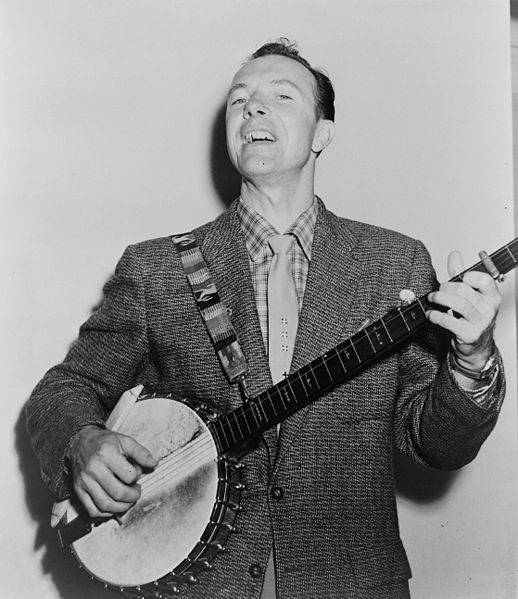A series of May Day events is taking place on May 3rd and May 14th celebrating the life of legendary folk singer, banjo player, and political activist Pete Seeger, who passed away in January. After a flyer for the event was circulated, my friend Barbara Kessel emailed me about her recollection of Pete Seeger’s 1958 visit to the University of Illinois when he was banned from performing on campus during the red scare. The incident is a reminder of how widespread the blacklist was, even reaching this Midwestern college town. As the civil rights movement was gaining momentum and “the sixties” were just around the corner, Barbara recalled a “new world” opened up to her that night.
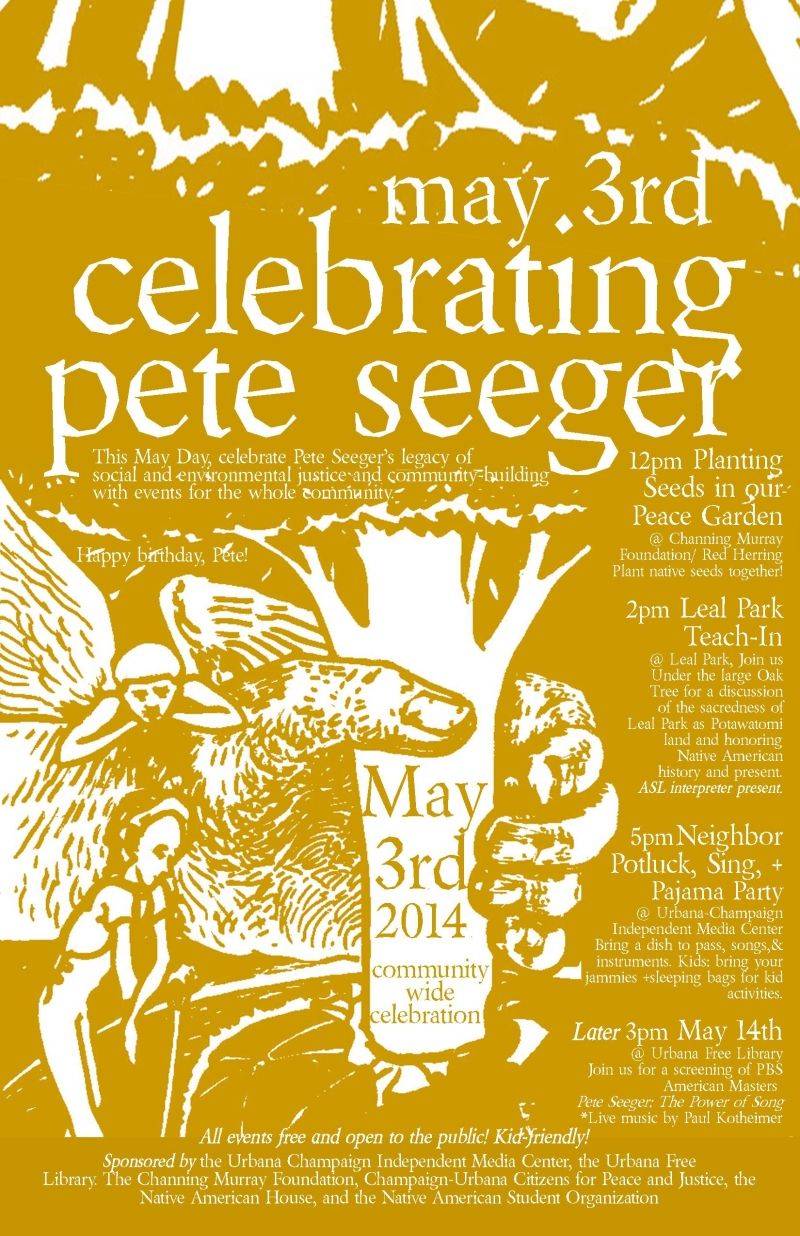
Pete Seeger’s troubles began after an August 18th, 1955 appearance in front the House Un-American Activities Committee (HUAC). By this time, Senator from Wisconsin Joseph McCarthy had been discredited, but the anti-communist witch hunt still lived on. Unlike others who claimed the Fifth Amendment right against self-incrimination, Seeger refused to answer questions on the basis of the First Amendment:
“I am not going to answer any questions as to my association, my philosophical or religious beliefs or my political beliefs, or how I voted in any election, or any of these private affairs. I think these are very improper questions for any American to be asked, especially under such compulsion as this.” [Read the entire transcript online.]
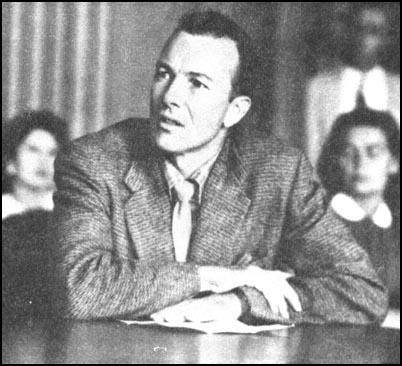
Indeed, Seeger had been a member of the Communist Party, first joining the Young Communist League in 1937 while a student at Harvard, passing out leaflets on campus about the Spanish Civil War, and joining a travelling puppet show performing to unions in upstate New York. He sang protest songs with the Almanacs, drawing the attention of the FBI who started following him as early as 1941. During World War II, Seeger joined the Army, spending most of his time performing for the troops. He toured with Henry Wallace whose third party presidential campaign in 1948 was supported by the Left. In 1949, Seeger was to perform in Peekskill, New York when the famous African American singer Paul Robeson was attacked by a mob whipped into a frenzy by the growing red scare.
In front of HUAC, Seeger was questioned about the various Communist-affiliated groups he had performed for. Seeger responded:
“I have sung for Americans of every political persuasion, and I am proud that I never refuse to sing to an audience, no matter what religion or color of their skin, or situation in life. I have sung in hobo jungles, and I have sung for the Rockefellers, and I am proud that I have never refused to sing for anybody.”
For failure to answer questions (at least, in the desired way), he was indicted for contempt of Congress on March 26th, 1957. In 1961, he was convicted by a jury and sentenced to one year in a federal penitentiary. He narrowly escaped imprisonment in May 1962 when an appeals court reversed the conviction, but throughout these years controversy followed him wherever he went.
Verifying the Story
In 1950, Seeger started another folk group, the Weavers. But in 1957 he left the act, uncomfortable with the folk group’s growing popularity. Striking out on a solo career, he turned to performing at smaller venues, such as summer camps, schools, and college campuses. On October 10th, 1957, Seeger played to a sell-out crowd at Smith Music Hall on the U of I campus with no apparent concern. The following year was different.

Barbara Kessel, a sophomore at the time, told me that Seeger “was banned to sing” on campus in 1958 because of his problems with HUAC. Instead, the University YMCA hosted his concert. Interested in local history, I wanted to try to verify if this story was true.
I went to librarians at the University archives, Jameatris Rumkis and Helen Sullivan, who scanned Board of Trustees and Chancellor’s meeting minutes, pulled boxes from University Y archives, and pointed me to the digitized files of the Daily Illini.
The University YMCA announced in early October 1958 that it was starting a membership drive with a concert by Pete Seeger. He was to be joined by the blind African American harmonica player Sonny Terry. The two had recorded a bestselling record at Carnegie Hall that was released on Folkways Records [You can listen the entire album online if you have a UIUC Net ID account]. That the two were playing at the Y, and not Smith Hall, appears to confirm Barbara’s account, although newspaper articles make no mention of a scandal.
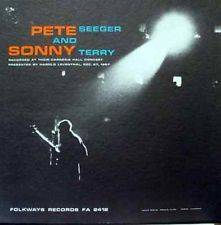
On October 28th, 1958, according the Daily Illini, Pete Seeger performed to a “full room” at the University Y’s Latzer Hall. The concert lasted for more than two hours and included three encores. Seeger played such songs as “You Are My Sunshine,” “Goodnight, Irene,” “John Henry,” and a song by Huddie Ledbetter, “Bourgeois Blues,” about segregation in the nation’s capital:
Me and my wife went all over town
And everywhere we went people turned us down
Lord, in a bourgeois town
It’s a bourgeois town
I got the bourgeois blues
Gonna spread the news all around
As Barbara remembered, it was a special night. Rumors about Seeger’s appearance drew a large crowd of those curious to know what all the fuss was about, including Barbara who was new to the growing social movement. “People were hanging from the rafters,” she recalled. “It was my first experience of a ‘movement,’ because the songs he had us all singing were often about resistance ― somewhere else, some other time, but by singing, we were part of it. A new world opened up that night. Of every moment of the three and a half years I spent at the University of Illinois, that is the most outstanding in my memory.”
The University’s Blacklist
When I asked how she knew about Seeger’s banning from campus, Barbara said she had heard the back story from one of her favorite professors, Harry Tiebout [pronounced Tee-bo], who “told us all about HUAC and what the university was up to.” Tiebout regularly met with Barbara and a group of admiring students in the basement of the YMCA. He had taught philosophy on campus since 1947 when he was hired. Founder of the local chapter of the NAACP, and a reformer within the Democratic Party, he was the most radical professor on campus at the time. Tiebout had a “big impact on me,” Barbara said.
According to archives of the University YMCA, Tiebout regularly attended board meetings. It was most likely Tiebout who arranged to have Seeger perform at the Y in 1958. Yet the board minutes do not include any discussion about Seeger. The only comment is from a meeting on November 24th, 1958: “The Pete Seeger concert came out about even financially. The membership drive has lagged considerably.” It suggests that the Y may have experienced a backlash for hosting Seeger. Yet neither I nor the librarians could find any other mention of the incident in University Archives. The decision to pull Seeger may have been made behind closed doors.
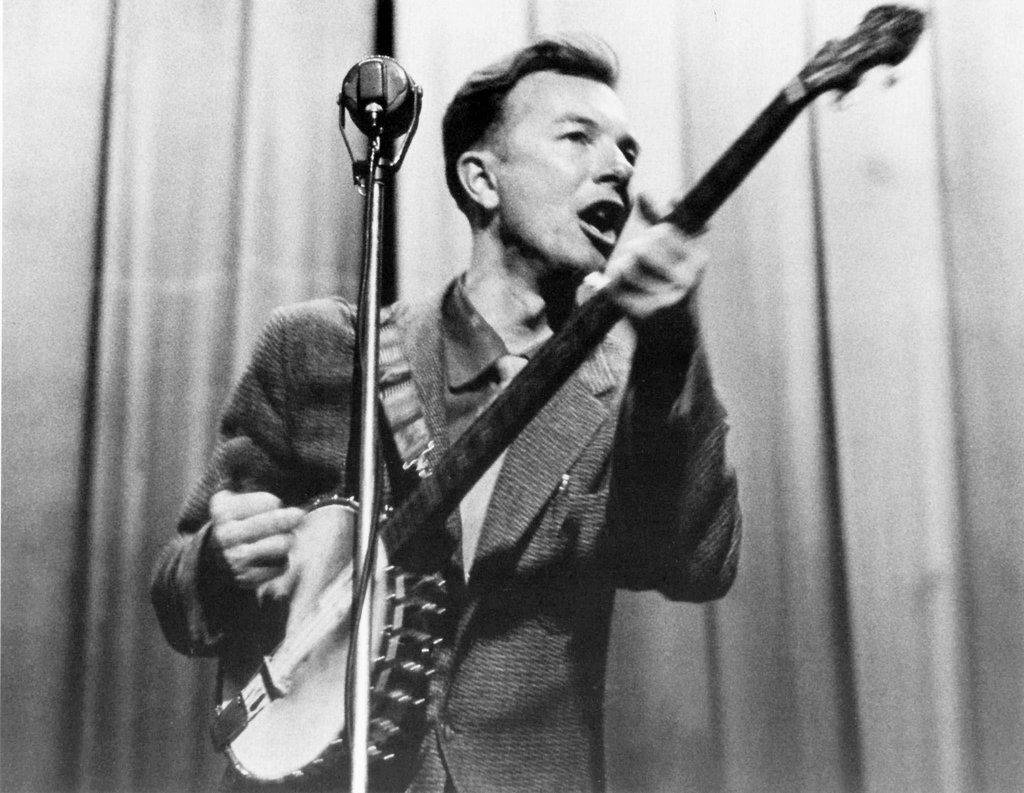 Finally, I found an article a month later in the Daily Illini, dated December 2nd, 1958, that confirmed Barbara’s account. It was part of a series explaining the YMCA’s programming. “Many complaints” have been made, it said, because the Y’s events competed with University-sponsored events. These criticisms were “ridiculous and invalid” the author said. Because of his “liberal” tendencies, Seeger was not allowed to perform in university facilities. He had apparently been placed on the “University’s blacklist.” When the Y stepped in to sponsor the event, it introduced a “new type of entertainment.” Indeed, the Y was helping to promote a revival of folk music that would come in the late 1950s and 1960s.
Finally, I found an article a month later in the Daily Illini, dated December 2nd, 1958, that confirmed Barbara’s account. It was part of a series explaining the YMCA’s programming. “Many complaints” have been made, it said, because the Y’s events competed with University-sponsored events. These criticisms were “ridiculous and invalid” the author said. Because of his “liberal” tendencies, Seeger was not allowed to perform in university facilities. He had apparently been placed on the “University’s blacklist.” When the Y stepped in to sponsor the event, it introduced a “new type of entertainment.” Indeed, the Y was helping to promote a revival of folk music that would come in the late 1950s and 1960s.
Pete Seeger’s appearance at the University of Illinois marked a period of transition from the Cold War to the social revolutions of the 1960s. Unlike many others, Seeger survived the blacklist and went on to achieve legendary status as a folk musician and fighter for social justice. He helped to popularize the song “We Shall Overcome” during the civil rights movement. Also an environmentalist, he spent much of his later life working to clean up the Hudson River. Please consider attending some of the upcoming events commemorating his life.
———
Saturday, May 3rd
May Day Celebration
Happy Birthday, Pete Seeger!
Celebrate Pete Seeger’s legacy of social and environmental justice and community-building with events for the whole community. Kid-friendly, disability-aware, and open to the public!
May 3rd
12 p.m. Planting Seeds in our Peace Garden
@ Channing Murray Foundation/Red Herring
Plant native seeds together! Bring seeds to donate if you’d like!
2 p.m. Leal Park Teach-In
@ Leal Park, Join us Under the large Oak Tree
A discussion of the sacredness of Leal Park as Potawatomi land and honoring Native American history and present. ASL interpreter present.
5 p.m. Neighbor Potluck, Sing, + Pajama Party
@ Urbana-Champaign Independent Media Center
Bring a dish to pass, songs,& instruments. Kids: bring your jammies +sleeping bags for kid activities.
May 14th
6:30 p.m. @ Urbana Free Library
Join us for a screening of PBS American Masters Pete Seeger: The Power of Song
Live music by Paul Kotheimer.
These events are made possible by Urbana Champaign Independent Media Center, The Urbana Free Library, The Channing Murray Foundation, Champaign-Urbana Citizens for Peace and Justice, the Native American House, and the Native American Student Organization.
Join the Facebook page event here.








